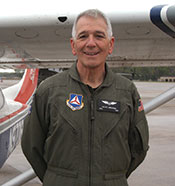
Nov. 20, 2017

NBAA asks Rep. Ralph Abraham, M.D. (R-5-LA) about the importance of general aviation to his district and why he feels ATC privatization would be harmful to general aviation.
On Twitter @RepAbraham
Q: Why is general aviation so important to your district?
A: Louisiana’s 5th District is rural. Our biggest towns – Monroe and Alexandria – have limited airline service, so we rely on general aviation to provide a critical transportation lifeline to the many smaller communities in the area.
Q: General aviation is especially important in times of crisis. During the 2016 floods in Louisiana, I flew over the affected areas with local officials to help assess the damage. Later, I joined with Pilots for Patients to fly donated supplies to Baton Rouge for the Catholic diocese to distribute to shelters.
A: Louisiana’s 5th District is rural. Our biggest towns – Monroe and Alexandria – have limited airline service, so we rely on general aviation to provide a critical transportation lifeline.
Q: General aviation also is important to the entire country, and you feel that ATC privatization could be harmful. Why?
A: In April, I sent a letter to the president, asking him to reconsider his stance on ATC privatization because of my deep concern over the detrimental effects that privatization would have on the national aviation system.
Rather than relying on user fees to fund the system, I believe that the existing excise tax on aviation fuel is a fair model that ensures the most equitable collection and distribution of revenues to airports nationwide. Establishing a private ATC board outside the purview of Congress, with the unilateral power to impose user fees and allocate resources, could raise costs, depress general aviation, reduce system revenues and displace funding for small regional airports.
Proponents of ATC privatization often suggest that the Canadian ATC model is a way to decrease operational costs and increase efficiency. However, independent reports have found that fees in Canada have increased faster than those in the U.S. Furthermore, overhauling the ATC system and the current FAA funding model only threatens to further delay implementation of NextGen, which is needed to modernize our airspace.
Q: You have had a chance to compare the two ATC systems first hand, correct?
A: Yes. I have flown extensively in the U.S. and Canada and can report that while the U.S. is the busiest and most complex airspace in the world, it is also the safest and most accessible. Overhauling a model that has worked for generations threatens this accessibility and would have a negative impact on passengers, general aviation facilities, businesses and airports. The current problems with the FAA can and should be fixed with targeted congressional and administrative reforms, not by handing management of our public airspace to a private board.
I have flown extensively in the U.S. and Canada and can report that while the U.S. is the busiest and most complex airspace in the world, it is also the safest and most accessible. Overhauling a model that has worked for generations threatens this accessibility.
Q: What are some of the other important aviation issues?
A: I have been watching with concern the unfolding situation at California’s Santa Monica Airport and am working to help keep the airfield open. Also, as the representative of a district where crop dusting aircraft are used extensively, I am concerned about possible low-altitude conflicts with unmanned aircraft. Drones have many important potential uses, but I want to make sure they are safely integrated into our national airspace system.


 International Business Aviation Council Ltd.
International Business Aviation Council Ltd.